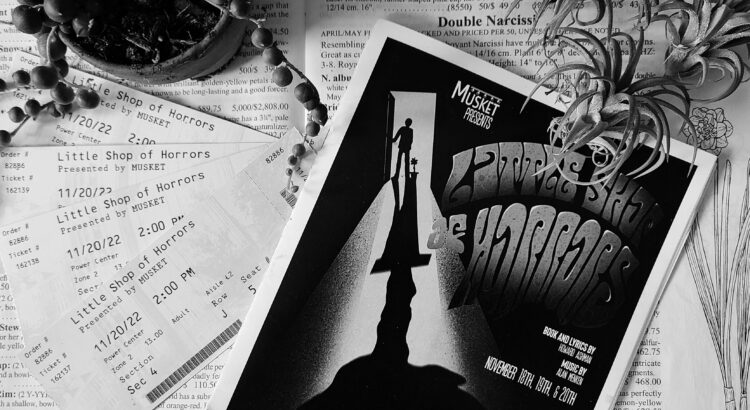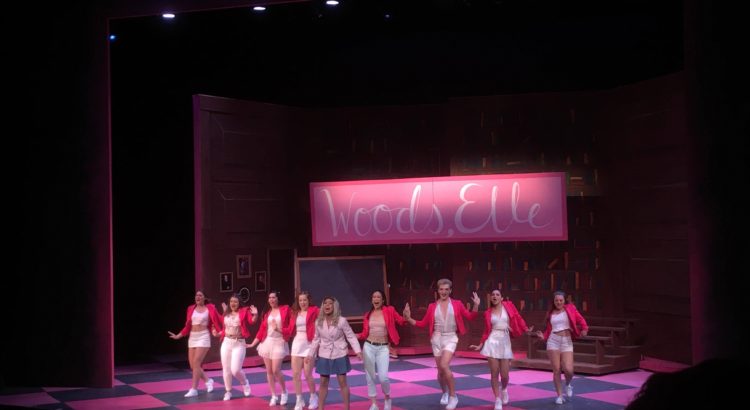
On November 10th, the University of Michigan’s student-led organization, Musket, put on its opening night performance of Heathers: the Musical. The musical follows Veronica Sawyer (played by Kaylin Gines) as she navigates her senior year as a part of Westerburg High School’s class of 1989 while trying to avoid the titular Heathers, the cruel popular girls of the school. Heather McNamara (Emelia Hughey), Heather Duke (Lila Harris), and the queen bee Heather Chandler (Bianca Garfinkle) make high school a living hell for the other students including Veronica and her best friend Martha Dunstock (Ellie Omori-Sampson). Along with the Heathers, Kurt Kelly (Sohil Apte) and Ram Sweeny (Dylan Bernstein) torment them with their inflated jock egos. It’s not until Veronica becomes a Heather herself and meets JD (Aaron Syi) do her plans of a quiet senior year under the radar go awry.
Heathers: the Musical satirizes the high school experience, portraying it as a battlefield of hostile personalities. It describes high school as a mimicry of the outside world with all of the hierarchies of adult society, posing the question of why childhood had to transform into this. Themes of gun violence, sexual violence, suicide, and grief of loss pervade the story, understanding that, here, the perils and dangers of adult society are inseparably coupled with the insecurity, longing, and anxiety of coming of age. As Kate Ivanov, the director of the musical, puts it in the Director’s Note, “there is a constant need to change, fit in, and be loved and accepted for who you are, when you don’t know who you are yet.”
The production itself is masterfully crafted in the Power Center’s proscenium stage. The set remains simple yet dynamic, always portraying Westerburg High, comprising a catwalk with two movable staircases that lead up to it. Still, in scenes that weren’t set in Westerburg High, there were parts of the set that were present that helped immersion while not detracting from the immersion of other scenes, including the gas station for “Freeze Your Brain” and the pier for “Kindergarden Boyfriend”. This use of the set, by not having any major set changes, streamlined the viewing experience and made it easy to follow the constant stimulation that the musical provides. The catwalk also gives good visual symbolism whenever the Heathers, but especially Heather Chandler, enters, demanding attention to their presence through the fact they are physically and socially above everyone else.
This experience wouldn’t be possible without the amazing performances from each of the actors as well. The way that the Heathers seem like one indomitable unit with their synchronization make the play as they set the tone of power hierarchy to which all of the play centers around, especially in “Candy Store”. Chandler especially commands her presence showcases devotion to the precision of her character work as in every scene she’s in she steals the show with her attitude and poise. When they eventually break off too the actors play faithfully to each of their individual characters’ emanating their respective traits: Duke’s envy and conniving nature shown through “Never Shut Up Again” and McNamara’s dumbness that gets deepened by the anxiety and vulnerability she shows in “Lifeboat”.
Kurt and Ram play their parts well as the comedic relief, their energy was outstanding, while still showing their ignorance and ego as almost perpetrators of sexual violence in “You’re Welcome” where they really expressed the childish entitlement they felt to sexual favors. Martha, although not playing the largest role in the play, stood out as not only someone with fantastic heart but an exceedingly impressive vocalist (I’m pretty sure “Kindergarden Boyfriend” held the largest applause of the night).
Of course, the leads Veronica and JD were the stars of the show, faithfully executing their characters to a caliber that exemplified the quality of their performance. As the leading lady, Veronica was intelligent and contemplative, executing the larger themes of the musical with ease and immersion. JD was a contemplative character that showed all the warning signs of his unhinged nature, yet the audience can’t help but fall in love with him the same way that Veronica does. They certainly complemented each other with several musical numbers that showed their exceptional vocal performance such as in “Dead Girl Walking”, “Our Love is God”, and “Seventeen” which I especially enjoyed.
Still, each of the members clearly showcased their love of the show of which I noticed their exceeding amounts of energy and the small details they implemented helped the immersion into the world of Sherwood, Ohio. Additionally, to provide a special shoutout, the production couldn’t had reached as high as it did without the performance of the pit orchestra. The score was excellently executed with each of the musical motifs highlighting each and every scene, not just with the musical numbers.
With my experience, I was overall blown away by the sheer skill, energy, and love of the show the cast had. The musical was comedic yet contemplative, energetic and fun yet satirical, tonally all over the place yet being able to ground itself when it needed to. Quality-wise, it was almost like watching an off-broadway production, and to think that Musket is a student-led organization speaks to the amount of time, skill, and effort it took to put out such a performance. I would definitely recommend to keep the productions UofM’s Musket in one’s mind if one wants to see great performances.






